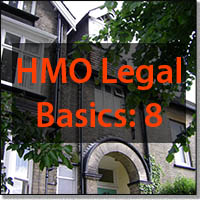 The HMO Legal Basics series is a collaboration between Tessa Shepperson and David Smith of Anthony Gold Solicitors. An HMO is a House in Multiple Occupation.
The HMO Legal Basics series is a collaboration between Tessa Shepperson and David Smith of Anthony Gold Solicitors. An HMO is a House in Multiple Occupation.
In this part of our HMO series we turn to licensing and we will be considering various aspects over the next few weeks.
Introducing licensing
One of the things which makes dealing with licensing so difficult is that it is not the same all over the country.
We have the basic licensing requirements, which are the ‘default’ rules. These are the minimum standards for HMO licensing, and if your property meets these criteria it will need to be licensed wherever it is. This is usually referred to as “mandatory” licensing.
Then we have the additional rules which apply in some parts of the country, where the local authority has applied for additional or selective licensing.
- Additional licensing is where a local authority wishes to licence landlords operating some type of HMO which is smaller than that required for mandatory licensing.
- Selective licensing allows the licensing of all landlords in a specific area, even non HMO landlords, if the area is one of anti-social behaviour.
This article will be looking mainly at mandatory licensing.
However we suggest that if you have an HMO property, you contact your local authority to find out, firstly to see if they have additional licensing now, and if not, if they are intending to apply for it.
If they are, then you need to get on their mailing list (if they have one) so you get kept informed of developments.
It is important to remember that there is a difference between an HMO, and an HMO which needs a licence. There are lots of HMOs around the country but rather fewer which require licensing.
The basic rules – when properties need a license
At present nationally, an HMO will need a license if it consists of three or more storeys and is occupied by five or more tenants in two or more households (see below for more detail on storeys).
If you are a landlord and are not sure if this applies to you, consider the following questions – if the answer is ‘yes’ you will probably need a licence:
- Do you rent out property?
- Does your property have three or more storeys (including habitable attics or basements which are the main entrance to the property)?
- Does your property have five or more unrelated tenants? Or
- Are any of your tenants unrelated to each other?
If you think your HMO may need a license, you should contact the Local Authority where your property is located as soon as possible and request an application form.
Properties, landlords and managers
Note that the license is for a specific landlord at a specific property. Each property and landlord will have to have a separate application and licence.
You cannot transfer a licence between properties or between landlords.
If you sell the property the new owner will have to apply to be the new licence holder as the license is not transferable to a different person.
There is a difference between licence holders and managers:
- A licence holder is normally the person who owns the property
- A manager is the person who is actually running the place on a day to day basis
A landlord can elect to fulfil both roles but they can also opt to use a professional manager, a lettings agent. In some cases landlords will be prevented from being managers of an HMO.
Working out the storeys
When counting the number of storeys in a building for HMO licensing purposes, you need to include:
- attics if they are occupied or have been converted for occupation by residents or if they are in use in connection with the occupation of the HMO by residents
- basements if they are the main entrance to the property
- any storeys which are occupied by you and your family if you are a resident landlord
- any business premises above or below the HMO, even of they are not connected to it
- any mezzanine which contains accommodation or is more than a mere landing
You do not need to count basements which are not part of the HMO unless the basement is the only, or principal, entrance to the HMO from the street.
So, for example, a two storey maisonettes above an unconnected shop, a two storey property with a loft conversion, and a two storey mews house with a ground floor entrance are all counted as having three storeys for the purposes of this legislation.
Next time we will be looking at license applications and the criteria which landlords need to fulfil.
Further HMO resources:
![]() Advice: If you need some legal advice, for example if you have been interviewed by your Local Authority and need advice, you can use our ‘HMO Hotline‘ telephone advice service.
Advice: If you need some legal advice, for example if you have been interviewed by your Local Authority and need advice, you can use our ‘HMO Hotline‘ telephone advice service.
![]() Training: Easy Law Training has regular workshops on HMO Law & Practice. You can read about these >> here (you will need to scroll down to find out the dates).
Training: Easy Law Training has regular workshops on HMO Law & Practice. You can read about these >> here (you will need to scroll down to find out the dates).